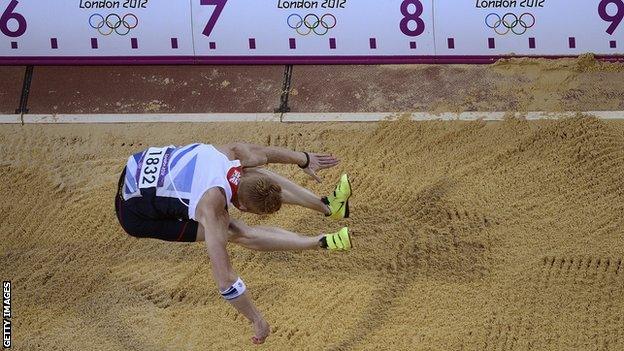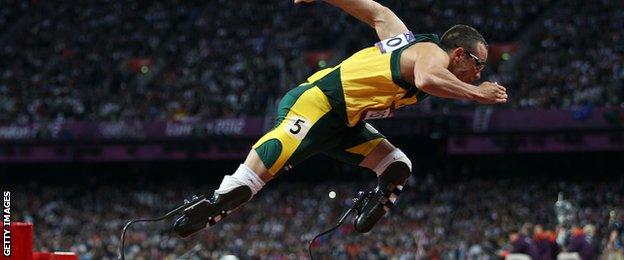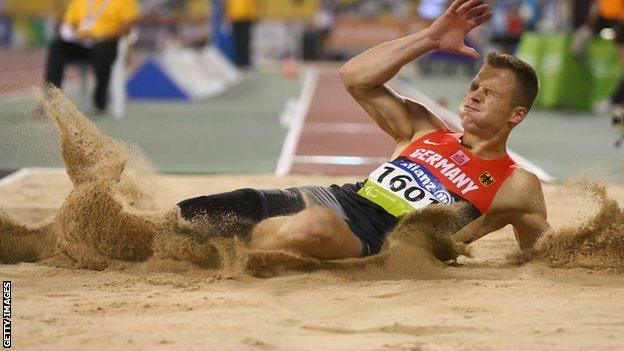Should 'Blade Jumper' Markus Rehm be allowed in the Olympics?
- Published
- comments
'Blade Jumper' Rehm wants Olympic glory
Paralympic long jump champion Markus Rehm has a dream of competing at both the Rio Olympics and Paralympics later this year.
But the German single-leg amputee is running out of time to prove that his carbon fibre running blade does not give him an unfair advantage over his Olympic rivals.
The 27-year-old set a world record of 8.40m in winning the T44 long jump event at the IPC World Championships in Doha in October - a distance that would have given him gold ahead of Britain's Greg Rutherford at the 2012 London Olympics.
It means the man known as Blade Jumper would be a genuine medal prospect for the Olympics, but he has told BBC Sport that it could cost him up to 300,000 euros (£232,800) to take tests to prove he is eligible to compete on the biggest stage of all.
Rehm, who lost his lower right leg in a boating accident when he was 14, wants athletics' governing body, the International Association of Athletics Federations (IAAF), to act quickly with the Olympics less than six months away.
"We have contacted the IAAF and we need to get some information on exactly what they need, what they want to measure and then I can see if there is a possibility of organising it," he explained.

Rehm's winning jump at the IPC World Championships in October would have beaten Greg Rutherford's gold medal-winning leap at London 2012
"But it is impossible for me to manage it myself - it's a lot of money.
"We need the information first. It doesn't make any sense to get measurements now and for the IAAF to say that isn't what they want.
"I really would love to have a measurement, to make it certain for everyone. I just want to do it fair, and that's why I've always offered to have measurements to find out what is the right way for us."
Rehm's long jump technique sees him jump off his prosthetic leg and experts have questioned whether the blade gives him an advantage when he plants it down at the point of take-off.
After he won the German National Championships in 2014, he was prevented from competing at the European Championships in Zurich because of concerns over the prosthetic.
The German Athletics Federation said then it had doubts over whether jumps with a prosthetic limb could be compared to those using a natural joint.
Rehm, who was due to compete against Rutherford in Saturday's Glasgow International Grand Prix before the Briton pulled out injured, wants to find a satisfactory solution but says that the prosthesis also limits his performance.
"For sprinting, I would set up my leg a bit different than for long jumping so I am a bit slower in my run-up and also I can't make adjustments when I take off," he explains.

Oscar Pistorius became the first amputee sprinter to compete at an Olympics at London 2012
"People don't see the hard work I do in training - if it was so easy to jump with a prosthetic leg more than eight metres, then why can nobody else do it?
"It would be a good sign for our sport if we could do it together, sit together at one table, talk about it, see what we need and how can we manage it.
"Being at the Olympics representing your country would be a special feeling. I can represent Paralympic sport as well and it would be an amazing chance to show what Paralympic athletes are able to achieve."
Analysis
BBC sports correspondent Andy Swiss
Markus Rehm's case has obvious echoes of South African Oscar Pistorius, who became the first amputee athlete to compete at the Olympics in 2012. But this case is arguably more significant because he has genuine medal potential.
When I spoke to him, Rehm came across as anything but a confrontational character. He said he would even be happy to compete at the Olympics without an official ranking - and therefore be unable to win a medal - simply so he can showcase Paralympic sport. Yet his frustration with his situation was obvious.
At the moment, some observers argue his blade must help him on take-off; others disagree, pointing out that it has to balance his left leg during the run-up. The truth is that nobody knows, because there has been no definitive research.
As the standard of Paralympic athletics improves every year, this is unlikely to be the last example of an amputee athlete wanting to prove themselves against able-bodied counterparts.
- Published19 January 2016

- Published23 October 2015

- Published22 August 2014
- Published8 February 2019
